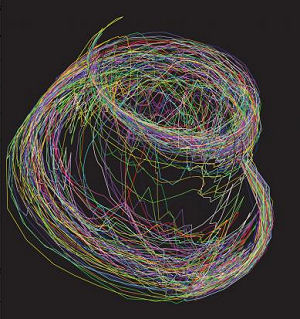 \
\
Advocates of genetic determinism square off against two prominent Stanford University scientists in a lively and surprisingly acerbic debate over “nature vs. nurture” in the February issue of the journal Current Anthropology.
The often contentious dialogue, which fills 20 pages of the journal, revolves around a controversial essay titled “Genes and Cultures: What Creates Our Behavioral Phenome?” by Stanford biologists Paul R. Ehrlich and Marcus W. Feldman.
“A central theme of the flood of literature in recent years in ‘evolutionary psychology’ and ‘behavioral genetics’ is that much or even most human behavior has been programmed into the human genome by natural selection,” Ehrlich and Feldman wrote. “We show that this conclusion is without basis.”
Members of Stanford’s Department of Biological Sciences faculty, Ehrlich, the Bing Professor of Population Studies, and Feldman, the Burnet C. and Mildred Finley Wohlford Professor in the School of Humanities and Sciences, are considered pioneers in the fields of genetics and evolutionary biology. Ehrlich’s latest book on the topic is Human Natures: Genes, Cultures and the Human Prospect. Feldman is co-author of the textbook Cultural Transmission and Evolution: A Quantitative Approach.
In their Current Anthropology essay, the authors noted that the general tendency among evolutionary psychologists is “vastly to overestimate how much of human behavior is primarily traceable to biological universals that are reflected in our genes. One reason for this overestimation is the ease with which a little evolutionary story can be invented to explain almost any observed pattern of behavior.”
As an example, they pointed to Pinker’s hypothesis that the fear of snakes and spiders may be genetically encoded in our DNA as a result of natural selection.
But in New Guinea, where poisonous snakes abound, local residents exhibit little fear of snakes, Ehrlich and Feldman said.
“While Pinker may have genes that make him fear snakes … such genes are clearly lacking in New Guinea natives,” they argued.
Another example of “a little evolutionary story,” said the authors, is the idea put forth by psychologist Bruce Ellis that women are genetically programmed through natural selection to seek a mate who is dependable, generous, ambitious and confident.
“Ellis is simply confusing the preferences of women he knows in his society with evolutionary fitness,” wrote Ehrlich and Feldman, noting that no data exist showing that women who seek those characteristics in their sexual partners are more successful reproductively.
From Ehrlich and Feldman’s perspective, evolutionary psychology is little more than a series of these “just-so” stories rooted in part on the premise that all human beings lived in the same environment of evolutionary adaptation during the ice ages and evolved similar genetic mechanisms that have not yet had a chance to change in response to modern circumstances.
But, according to the authors, this so-called “environment of evolutionary adaptation” never existed during the ice ages or at any other time since the Pleistocene era: “Our ancestors lived in a wide diversity of habitats, and the impacts of the many environmental changes (e.g., glaciations) over the past million years differed geographically among their varied surroundings.”
“Another reason laypersons tend to overestimate how much of our behavior is genetically determined derives from the claims of some scientists that the variation between individuals in behaviors is due to their genetic differences,” the authors wrote.
They pointed out that the field of behavioral genetics, which is closely related to evolutionary psychology, rests largely on a fundamental misunderstanding and misinterpretation of “heritability” – a concept introduced in the 1930s as a measure of how amenable agricultural animals and plants are to selective breeding.
“An accurate measure of heritability requires that parents and offspring be raised in identical environments,” the authors explained. “Under carefully controlled environmental conditions, [heritability] measures the fraction of genetic variation that would respond to selection by the breeder on a trait such as fat content in milk or egg production in chickens.”
The definition of heritability was later broadened to accommodate the fact that genes and environments sometimes interact in ways that cannot be estimated or controlled. Unfortunately, noted Ehrlich and Feldman, this broad-sense definition of heritability is repeatedly used by behavioral geneticists to predict a wide range of human behaviors.
“Many of the heritability estimates are derived from studies of twins, which are based on the dubious assumption that the environments of fraternal twins are as similar as the environments of identical twins,” they added. “We often see headlines in major newspapers that summarize the claims of behavioral geneticists with ‘Gene for Happiness Found’ or ‘We Vote with Our Genes.’ But the text is not really about genes but about the behavioral geneticists’ interpretation of their own estimates of heritability computed from twin studies.”
Ten researchers responded to Ehrlich and Feldman, including Bernardo Dubrovsky of McGill University in Montreal and Ian Tattersall of the American Museum of Natural History in New York, who generally praised the Stanford scientists.
“Ehrlich and Feldman advance serious and valid criticisms of the methods used by evolutionary psychologists and behavioral geneticists, and identify factual errors frequently made by them,” Dubrovsky wrote.
“The press in particular appears to be entranced by the simplistic reductionisms of ‘evolutionary’ or ‘Darwinian’ psychology – possibly because, whatever else it may be, H. sapiens is a storytelling creature, and such accounts certainly make tidy stories,” Tattersall added.
But the majority of responses published in Current Anthropology took strong exception to Ehrlich and Feldman’s point of view.
“Accused of spinning ‘just-so stories,’ evolutionary psychologists have, in fact, tested their hypotheses in hundreds of studies with many thousands of subjects in scores of different cultures and have published their results in the world’s top science journals,” wrote Edward Hagen of Humboldt University in Berlin. “Empirical research, not armchair criticism, will determine whether these hypotheses stand or fail.”
To call an evolutionary psychological story a “just-so story” is “divisive name calling,” added Harmon R. Holcomb, a member of the University of Kentucky’s philosophy faculty, arguing that Ehrlich and Feldman misrepresented Pinker’s “just-so story” about an inborn phobia of snakes.
Psychologist Timothy D. Johnston of the University of North Carolina-Greensboro rejected the Stanford authors’ critique of Ellis: “The ways in which a particular man or woman makes decisions about sexual attractiveness, marital fidelity and other matters that define patterns of mate choice depend on interactions between his or her neural circuitry and the various opportunities for mating available in the environment. That neural circuitry in turn depends on a developmental history in which genes and environment have played essential roles that are very hard (though not impossible) to analyze.”
Behavioral ecologists Marc Hauser and Richard Wrangham of Harvard University took issue with the Stanford team’s statement that “heritability should be restricted to plant and animal breeding where it can be better measured and the results put to some practical use.”
There is no reason that Ehrlich and Feldman need to commit themselves to such an extreme position, Hauser and Wrangham countered, noting that studies comparing identical twins reared apart in different environments with identical twins reared together “is surely a point in favor of teasing apart genetic and environmental influences. Why is this any different from a study of corn?”
The Harvard researchers also expressed concern that Ehrlich and Feldman “have set up a straw man carrying a basket of red herrings,” pointing out that “no one argues for complete genetic determinism.”
In rebuttal, the Stanford authors argued that very visible evolutionary psychologists, such as MIT’s Pinker, do not acknowledge “the importance of interactions and of cultural evolution” but promote the idea of a genetically fixed human nature. Circumstances and experiences contribute to each individual’s nature rather than all of us having a human nature that has been genetically fixed by our evolutionary history, they observed.
“Our reply to Hauser and Wrangham’s question – why one can estimate heritabilities in corn and not people – is straightforward,” Ehrlich and Feldman added. “It would be unethical to raise groups of people in ‘identical’ environments and then do one-generation selection experiments to estimate heritabilities. And the results would be totally uninformative, since they would only speak to heritability in that artificial environment.”
They concluded: “We do not dismiss evolutionary thinking about human beings as having no value. On the contrary, we advocate careful, rigorous empirical and theoretical studies that address the role of evolution in the human sciences.”


















Comments are closed.